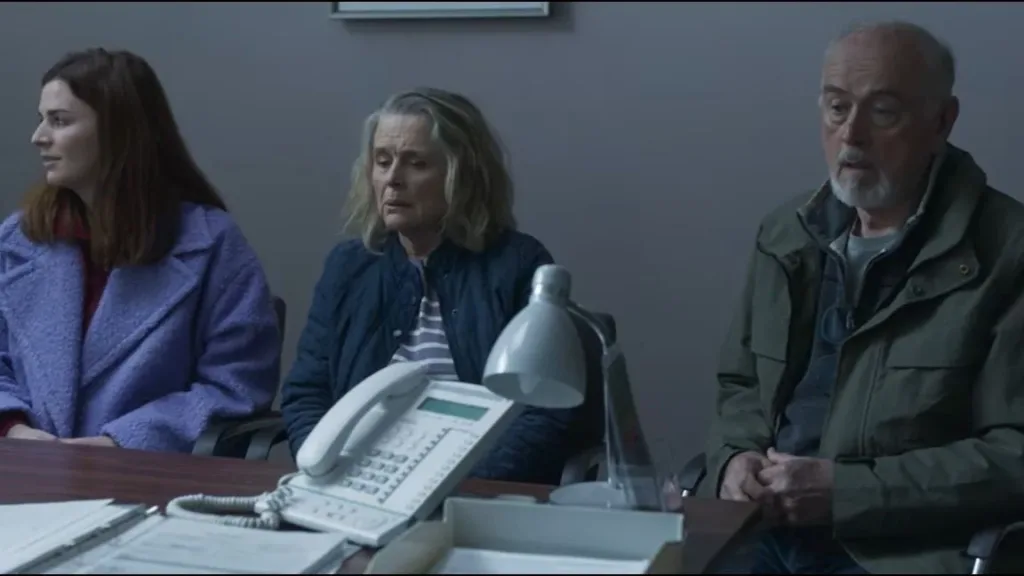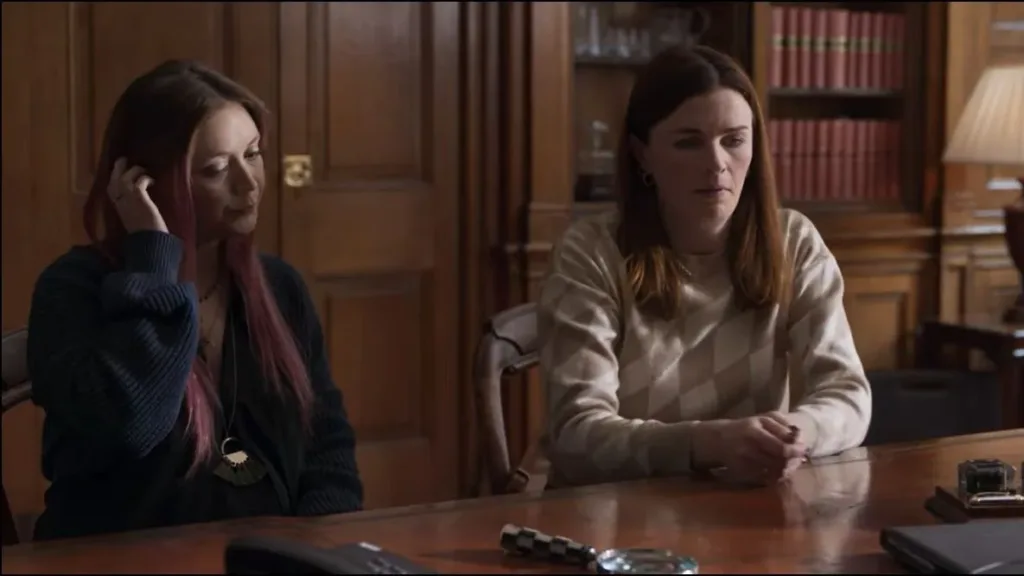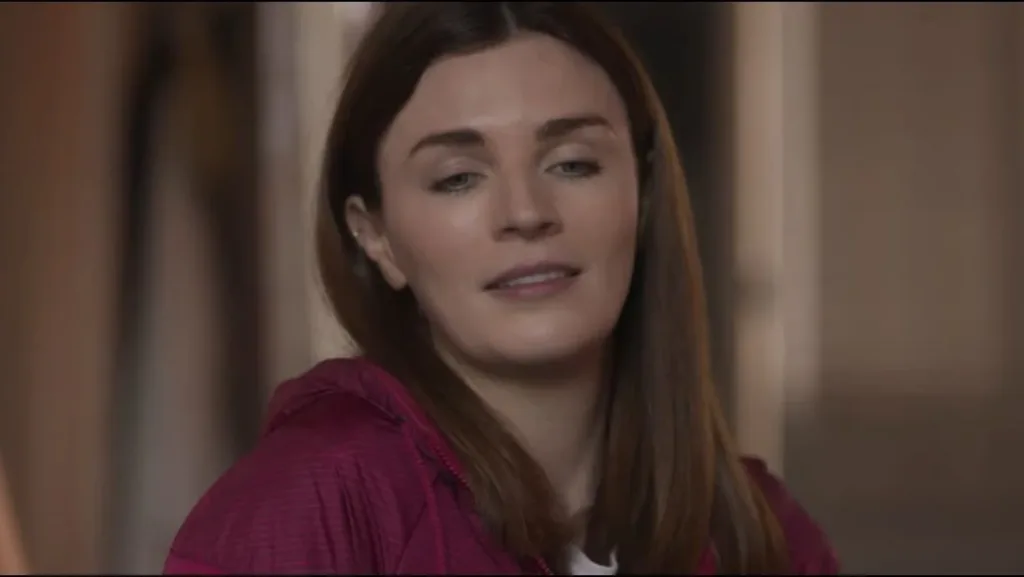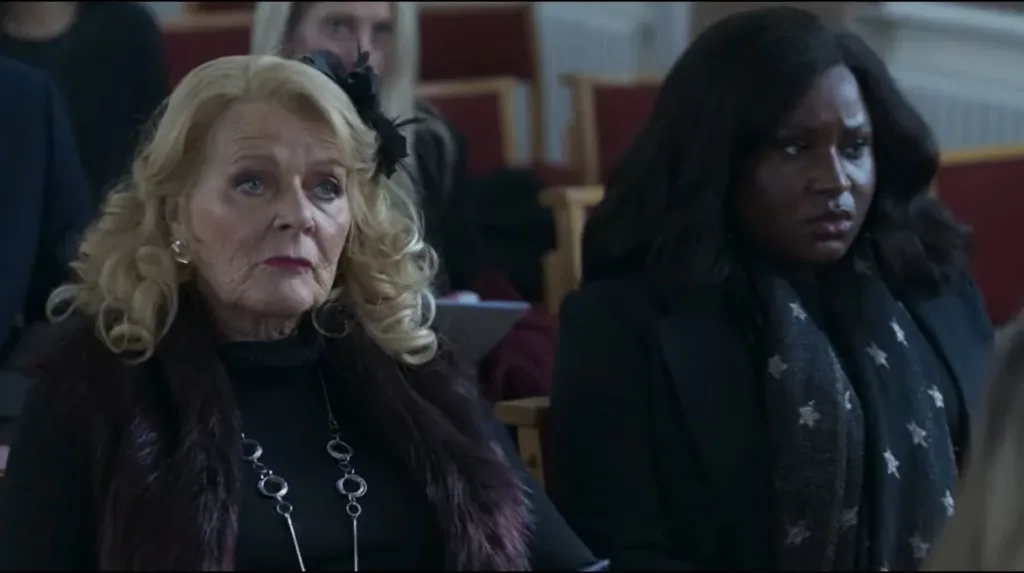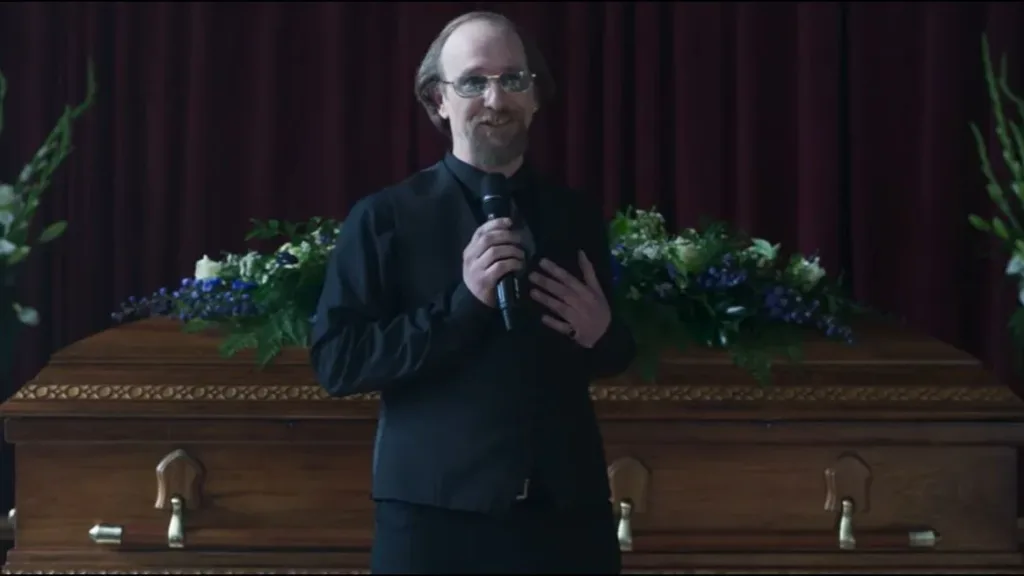After finding happiness in her relationship with fiancé Nathan, Londoner Gemma faces heartbreak when a tragic accident takes his life shortly before their wedding. Refusing to give up on the future they planned together, Gemma makes a surprising decision – she will go ahead with marrying Nathan, even though he has passed. With permission required from authorities to make their union legally binding, Gemma embarks on an uphill journey to convince them of her case.
Joining Gemma on this unexpected path is Nathan’s sister Audrey, a free-spirited artist who travels from America to support Gemma in her endeavor. Though opposing viewpoints from Gemma’s family and friends pose challenges, with help from Audrey’s unbounded spirit she fights passionately for her goal. Along the way we learn more about Gemma and Nathan’s bond through flashbacks, witnessing a romance that despite its brevity clearly meant the world to Gemma.
Through Aisling Bea’s touching lead performance we feel Gemma’s sadness but also her determination in grieving Nathan through this unorthodox plan. Billie Lourd brings an offbeat charm as Audrey helping Gemma through hard times with humor. Their dynamic takes what could have been a saccharine story into more complex territory.
While juggling comedic and dramatic tones isn’t always seamless, when focusing on the characters’ journey And Mrs becomes a poignant film exploring how people cope with loss in unexpected ways. Fans of stories with heart will find meaning in Gemma’s message about the enduring power of love.
Gemma’s Journey of Grief
The story begins as Gemma’s world is turned upside down. Returning home one day, she makes a tragic discovery – her fiancé Nathan has unexpectedly passed away. We soon learn he died from a blood clot, in what must have been a terrifyingly sudden turn of events.
Still reeling with shock and sorrow, Gemma learns of an old law that could allow her to go ahead with marrying Nathan posthumously. Called “necrogamy”, it was intended for war widows long ago. Whether such a rule truly exists remains uncertain. But for Gemma, clinging to their planned future seems her only lifeline in those dark early days.
And so her journey beings, seeking permission from judges and authorities to make Nathan her husband even after death. Gemma’s motives appear to stem from unwillingness to let go of someone so dear, rather than logical thought. We feel her anguish through Bea’s nuanced performance.
As Gemma navigates legal red tape and opposition, her bond with Audrey grows unexpectedly. Where their connection could’ve become an overwrought subplot, their dynamic offers sweet moments of understanding. Audrey’s free spirit provides levity to Gemma’s gloom.
While side adventures like Gemma and Audrey’s antics feel tangential at times, the core plot shines in its depiction of processing loss. Through flashbacks of Gemma and Nathan’s romance we understand her pain, and why clinging to his memory is her way forward. Overall the story succeeds in its moving portrayal of grief’s complexity.
A Journey of Hearts
When we first meet Gemma, she seems far from ready to settle down. Despite caring for Nathan deeply, she claims lifelong love is impossible, as “all families are screwed up”. Bea brings a spark to this skeptic, her wit and hesitance making Gemma relatable.
Yet through flashbacks we see Nathan’s joy for Gemma helped soften her guarded nature. Played by Hanks with inherent goodness like his father, Nathan clearly cherished every moment with Gemma. His death devastates her, leaving a soul-deep void. In her grief, Gemma grasps at marrying him as lifeline to the future stolen from them both.
Audrey’s arrival disrupt the delicate process of mending Gemma’s shattered heart. Lourd imbues the hippy sister with a zany charm and good heart under the surface. She aims to honor her late brother by standing with Gemma, even if her antics cause pain too. An unlikely bond grows that helps both find solace.
As Gemma’s driven but concerned mother, Cusack brings warmth. Wokoma adds depth as Ruth, who loves Gemma too much to watch her danger. Each character feels touchingly real, teaching that families are made by care, not genetics.
Through it all Bea shines, showing our fragile human capacity for resilience. We see her transformation from a woman who dismissed marriage to one pursuing it against all odds out of fierce and undying love. Her journey reminds that while loss breaks hearts, in the end only love remains to mend them once more.
Moving On and Letting Go
Losing someone we care for cuts deeply, and the film seeks to capture how people cope in their own ways. For Gemma, refusing to accept Nathan’s death and clinging to their planned future provides temporary respite from despair.
Her unconventional idea raises profound questions. What makes a union between two people? Is it legal documents, or the bond of hearts? If love persists beyond parting, do technicalities of death still divide soulmates?
These threads of grief, love and finding purpose amid chaos form And Mrs’ core. But handling such weighty themes grows tricky when levity is just as needed. The movie works best highlighting our shared human frailties, and how healing comes through community.
Amid loss we often turn inward, replaying memories that still bring joy. Yet isolating oneself prolongs the pain, as Audrey and Gemma’s bond shows. Their divergent pasts with Nathan, and Gemma coming to see Audrey’s value teaches that families are built from care, not blood.
While providing no easy answers, And Mrs captures loss’s complexity. We see in Gemma’s subtle transformation that while time may soften sadness, one never fully “gets over” losing someone forever in our lives. With compassion it reminds that living well is often the finest tribute we can pay the departed.
Finding Lightness in Dark Times
Grief rarely feels funny yet laughing through tears can relieve heavy hearts. And Mrs walks this line deftly at moments but stumbles too. Bea and Lourd share witty rapport, their banter breathing life to a sorrowful story.
Scenes like lovelorn pub owner Nish bringing absurdist charm to sadness resonate. His flair shows even bleak jobs can spark joy. Yet other attempts feel forced. Audrey crudely interrupting grief or gratuitous crassness undermine goodwill.
Too often quirkiness drowns out pain it ought ease. When embracing grief’s awkwardness and letting characters grieve naturally, truth shines through. Subtler humor alongside honesty in anguish helps audiences feel less alone in suffering’s madness.
Yet Reisinger can’t always strike this balance. Tonal shifts become whiplash where darkness deserved deeper exploration. An earnest finale feels undercut by misjudged levity.
At its best this tale teaches that while tears must fall, together we can find moments of light to guide us through darkness. But manipulating emotions loses viewers willing to walk that hard road hand in hand. When comedy and catharsis intertwine with care, stories can heal by sharing what it is to be blessedly, imperfectly human.
Breathing Life into Loss
Reisinger tasks himself with marrying bleakness and whimsy, no simple feat. His direction draws us in, using lush London backdrops and intimate shots that lay bare characters’ pain.
Flashbacks allow glimpses into Gemma and Nathan’s romance in crafted monochrome, their love tangible. Bea and Hanks radiate chemistry through even ghostly scenes. Reisinger breathes soul into Nathan, keeping his spirit guiding Gemma.
Mise-en-scène drips with care, from peeling parish hall walls to cluttered flats feeling lived-in. Light and framing lend beauty to everyday struggles. Score and needle drops walk subtleties between tears and smiles.
Yet tone shifts test balance. Rushmore’s chirpy ending jarring against drama’s throb. Loose subplots diffuse focus when characters merit our lingering gaze through grief’s mire.
Reisinger draws out actors’ humanity, realism moving where quips fall flat. Viewers share characters’ tears because his direction honors emotional truths above tricks. Though imperfect, And Mrs stays with us through compassion for life in all its broken, beautiful complexity. For that tender vision, Reisinger deserves recognition.
A Heartfelt Yet Flawed Glimpse into Grief
And Mrs wears its heart on its sleeve in telling Gemma’s poignant story. Reisinger strives to handle heavy themes of loss and learning to find purpose after tragedy. At its best, brief moments ring truly thanks to Bea’s moving lead performance.
Yet an inability to maintain tonal balance proves the film’s greatest flaw. Where grief and humor intertwine gracefully, forced comedy disrupts the tender core. Loose threads and prolonged diversions dilute what works well – real characters wrestling with big questions.
Those seeking sensitive portrayals of processing loss may find empathy despite imperfections. Bea shines brightest in intimate scenes just allowing her pain to speak plainly. It’s a reminder that healing often comes gently, one moment at a time, not from flashy tricks.
While not transforming the genre, And Mrs takes risks to bring anguish to light that some will appreciate. For open-hearted souls willing to forgive missteps, its comforting message of memories sustaining love even past parting lingers. Though strides are still ahead, any work shining a light in darkness deserves attention.
The Review
And Mrs
In conclusion, while And Mrs shows flashes of poignant storytelling in exploring grief, its inconsistent tonal shifts and scattered storylines undermine the heart it wears on its sleeve. For those tolerant of flaws who seek sensitive representations of loss, glimpses of truth may yet shine through.
PROS
- Strong lead performance by Aisling Bea that anchors the emotional core
- Sensitive depiction of grief's complexity with glimpses of truth
- Original premise with potential to provide insight
CONS
- Inability to balance comedy and drama tonally
- Loose and prolonged subplots that distract from central story
- Failure to mine director's personal tragedy for compelling characterizations







































